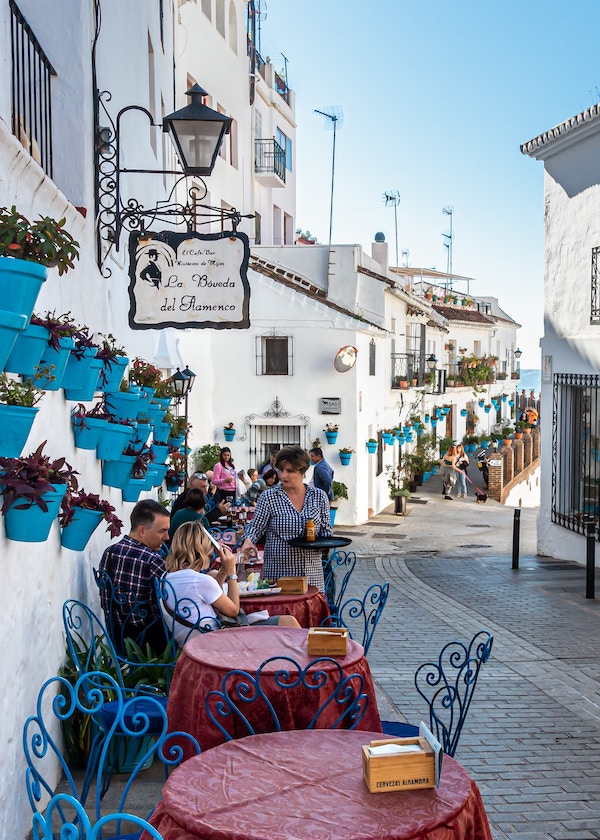By: Nahla ElKazak / Sarah Stone
Skip to...
Spain is a popular destination for tourists from all over the world. It’s a country that offers something for everyone, whether you are looking to relax and unwind or want to experience some of Europe’s most famous cities. There are different types of visas that you can apply for depending on why you’re visiting Spain.
For most countries, visitors need a visa to visit Spain. Some exceptions include nationals from European Union member states, Iceland, Liechtenstein, Norway, Switzerland, and Andorra.

Photo by Jorge Salvador on Unsplash
Spain Short-Term Visa & Tourist Visas
If you plan to stay less than three months then you can apply for a Schengen visa. However, if you need to stay longer than 90 days, you will have to apply for one of Spain’s long-stay visa options.
Schengen Visa
The Schengen visa is a visa that allows you to travel freely throughout the European Union. It can be obtained from any of the EU member states. The Schengen visa is valid for up to 90 days within the Schengen Area.
Who Needs a Schengen Visa to Enter Spain?
Except for some countries, travelers to Spain for purposes of tourism or business (like to attend a conference) need to obtain a Schengen visa beforehand. Countries whose nationals can travel to Spain without a Schengen visa include European Union member states, Iceland, Liechtenstein, Norway, Switzerland, and Andorra
Visa requirements for other nationalities vary by country. For example, citizens of Australia, Canada, Japan, New Zealand, South Korea, and the United States do not need a Schengen visa to enter Spain.
What Documents Are Required for a Spain Schengen Visa Application?
The Spanish embassy or consulate in your country will ask for some documents before they can process your visa application. Even though some requirements may vary depending on your country of origin, there are some mandatory documents that you will need to submit based on the purpose of your visit.
Traveling to Spain for Tourism
If you’re not eligible for visa-free travel, then you’ll need to obtain a Schengen visa to enter the country as a tourist.
Required documents:
- Fill out the visa application form
- Pay visa fees ($96)
- Your passport and a copy—it has to be valid for at least 3 more months from your planned stay
- Return flight booking or proof of ongoing travel
- 2 recent photos that have been taken within the past 3 months
- Proof of funds. You’ll have to provide evidence that you have enough money to cover your stay in Spain and any other Schengen state you may visit. This can be done by providing your bank statement or, if someone will support you financially in Spain, a sponsorship letter.
- Travel health insurance that covers at least about $33,500 in medical expenses, valid for the duration of your stay.
- Proof of your employment status:
- If you’re employed: provide your employment contract, leave permission from your employer, and proof that you’ve been paying your taxes
- If you’re self-employed: A copy of your business license, your company’s bank statement (last 6 months), and your ITR (income tax return)
- If you’re a student, you’ll have to provide proof of enrollment and no objection letter from the university
- Proof of accommodation—this can be a hotel booking or a lease agreement
- If your tour is planned for by an agency, you’ll need to present a letter from the travel agency
- Your travel itinerary, which should include a description of your trip to Spain and any other country you plan on visiting in Europe
Traveling to Spain for Business
A Schengen business visa is a short stay visa that allows you to visit Spain for specific business purposes like attending conferences, meetings, or training.
Required documents:
- Fill out the Schengen Business visa application form
- Pay visa fees ($96)
- Your passport and a copy. It must be valid for at least three more months beyond your trip
- Return flight booking or proof of ongoing travel
- 2 recent photos that have been taken within the past 3 months
- A letter from your employer stating why you need to attend the conference/meeting/training. It should contain information about the purpose of your visit, your expected length of stay, and any additional costs associated with your trip. The letter should also explain how the meeting/conference/training relates to your work.
- You’ll also need to prove that you have sufficient funds available to cover your stay in Spain. This can be done through a bank statement or a personal guarantee from a sponsor who will pay for your stay.
- Travel health insurance that covers at least about $33,500 in medical expenses, valid for the duration of your stay
Traveling to Spain to Visit Family or Friends
If you have a family member or friend in Spain that you’d like to visit, you can ask them to write you an invitation letter to present with your visa application.
Required documents:
- Fill out the visa application form
- Pay visa fees ($96)
- Your passport and a copy. It has to be valid for at least 3 more months from your planned stay.
- Return flight booking or proof of ongoing travel
- 2 recent photos that have been taken within the past 3 months
- Proof of funds. You’ll have to provide evidence that you have enough money to cover your stay in Spain and any other Schengen state you may visit. This can be done by providing your bank statement or, if someone will support you financially in Spain, a sponsorship letter.
- Travel health insurance that covers at least about $33,500 in medical expenses, valid for the duration of your stay
- A letter of invitation from your relative or friend in Spain. If they’re not a Spanish national, then a copy of their residency permit must be attached.
- Proof of your employment status:
- If you’re employed: provide your employment contract, leave permission from your employer, and proof that you’ve been paying your taxes
- If you’re self-employed: A copy of your business license, your company’s bank statement (last 6 months), and your ITR (income tax return)
- If you’re a student, you have to provide proof of enrolment and no objection letter from the university
- Proof of accommodation. This can be a hotel booking or a lease agreement
- Your travel itinerary. This should include a description of your trip to Spain and any other country you plan on visiting in Europe

Photo by Florian Wehde on Unsplash
Spain Long-Term Residence Visas
The Schengen visa limits your stay to no more than 90 days during which you’re not allowed to work. To obtain residency in Spain, depending on your situation, you will have to apply for a different type of visa.
Unless you’re a citizen of an EU country, you’ll need to obtain a work visa to work legally in Spain and you’ll need to apply for it in your country of residence. There are two types of Spain work visas: employment vs. self-employment visas.
Spain Employment Visas
These visas allow you to work with the sponsorship of a Spanish employer. The most popular categories of employment visas from which you can choose are Spain Au Pair visa, the Spain working holiday visa, and work employment visa.
Spain Au Pair Visa
This visa allows you to live and work in Spain for families in jobs such as babysitting. If you’re a student, you may be able to meet the specific criteria of this type of work visa.
Requirements:
- Your age is between 17 and 30 years old
- You must speak at least Spanish
- You can find a family to sponsor you before you can apply
- You have no children
After you’ve found a family to work with, you can now proceed with your visa application process and submit the required documents:
- Visa application form
- Pay visa fees. US citizens will pay $160 (fees can vary from one nationality to another)
- Your passport and a copy. It has to be valid for at least 3 more months from your planned stay.
- Return flight booking or proof of ongoing travel
- 2 recent photos that have been taken within 3 months
- Proof of funds. You’ll have to provide evidence that you have enough money to cover your stay in Spain and any other Schengen state you may visit.
- Travel health insurance that covers at least about $33,500 in medical expenses, valid for the duration of your stay
- Medical Certificate that you’re free of any disease that can badly affect public health
- Agreement with the family that will sponsor you. It should state the work conditions you agreed upon like working hours, obligations, and the pocket money they’ll pay you. The agreement should also include the duration which cannot exceed one year.
- Background check
- Invitation letter from the host family (notarized)
Spain Working Holiday Visa
You can use this visa if you wish to work for some time while you’re vacationing in Spain. This visa is limited to very few countries, namely Australia, Canada (age 18-35), Japan, South Korea, and New Zealand. You have to be between the age of 18 and 30 (except for Canada).
In addition to your nationality, there are some more requirements to the working holiday visa that you have to meet:
- You have not been part of this program before.
- Your overall employment period should not exceed 6 months. However, you can work for the same employer for no more than 3 months.
Required documents:
- Visa application form
- Pay visa fees
- Your passport and a copy. It has to be valid for at least 3 more months from your planned stay.
- Return flight booking or proof of enough funds to buy one
- 2recent photos that have been taken within 3 months
- Proof of funds. You’ll have to provide evidence that you have enough money to cover your stay in Spain and any other Schengen state you may visit. This can be done by providing your bank statement or, if someone will support you financially in Spain, a sponsorship letter.
- Travel health insurance that covers at least about $33,500 in medical expenses, valid for the duration of your stay
- Medical Certificate that you’re free of any disease that can badly affect public health
- Background check
- Provide proof that you’ve completed at least 2 years of higher education
- You must have at least basic knowledge of the Spanish language
- Have an employment contract.
Spain Work Employment Visa
As the name suggests, to obtain a work employment visa, you need to have a work contract with a Spanish company. You must find a job for which there aren’t suitable candidates in the EU and is listed as a “Shortage Occupation.”
Required Documents:
- Fill out the visa application form
- Pay visa fees ($190 for US citizens)
- Provide 1 personal photo with the form
- Your passport and a copy
- Authorization of work and residence permit approval issued by the Ministry of Labor in Spain. It must be not older than 30 days.
- Provide a job contract with your prospective employer that proves you will have the minimum required funds
- Valid health insurance
- Medical Certificate that you’re free of any disease that can badly affect public health
- A background check issued within the past 3 months
Spain Self-Employment Visa
This visa does not require sponsorship by a Spanish company. It allows you to run your own business or work as a freelancer in Spain.
Required Documents:
- Fill out the visa application form
- Pay visa fees ($515 for US citizens)
- Your passport and a copy
- You’ll need to provide professional qualifications and academic certifications to show that you meet certain requirements for conducting your business
- Proof of investment income
- A business plan that has been pre-approved by a relevant Spanish organization like ATA, UPTA, UATAE, CIAE, and OPA
- Valid health insurance for the duration of your stay
- Medical Certificate that you’re free of any disease that can badly affect public health
- A background check issued within the past 3 months

Photo by Simon Hermans on Unsplash
Spain Digital Nomad Visa
The Spain Digital Nomad Visa, which is bundled within its new startup law encouraging tech and innovation growth nationwide, allows non-EU citizens to live and work in the country as a remote worker employed with a foreign company (or a freelancer working with foreign clients) for up to five years.
Under this visa, you will be taxed through a non-resident income tax regime, rather than the resident rate—meaning that you’ll pay a flat tax of 24% on earnings up to €600,000. This is much better than the progressive tax rate, which can get up to 50%.
Read more detail about the digital nomad tax rates for Spain, and how to navigate the process here.
What Are the Requirements and Application Procedures for the Spain Digital Nomad Visa?
To qualify for the Spain Digital Nomad Visa, you must:
- Be a citizen of a country outside of the EU
- Prove you have a minimum monthly income of at least 200% of Spain’s monthly minimum wage (currently €1,260 per month)
- If you’re bringing family with you (spouse or children), then you must prove that you either have enough in your bank accounts or earn enough to cover at least 75% of the Spanish monthly minimum wage per each family member
- Be employed remotely by a non-Spanish company for at least three months prior to your application, and the company must have been in existence for at least one year—if you’re a freelancer who’s working remotely, you cannot work for Spanish companies. As a freelancer, you must also show that you’ve been working with your clients for at least three months prior to your application.
- If you do earn any additional income from within Spain, it can’t exceed 20% of your salary
- If you’re employed by a company and working remotely, the company must provide proof that your job is a remote position; if you’re a freelancer, you must show through the terms of your contract with each company you work with that your job can be completed remotely
- Show that you have a relevant college degree or at least three years’ work experience
- Obtain private health insurance for the duration of your stay
- Have a clean criminal record going back at least five years
There are two main ways to apply for the new digital nomad visa. Either you can enter Spain on a regular tourist visa and apply immediately for a three-year stay as a digital nomad, or you can apply from your home country for a one-year stay, which can later be modified for a three-year stay once you’re in Spain. Your visa can be extended for up to five years’ total.
Once you’ve submitted all of your required documents, you’ll be fast-tracked toward your digital nomad visa, with approval within 20 days.
If you’d like to become a permanent resident or even a citizen, the years you live in Spain as a digital nomad count toward your application.
More resources:
- Consular services: Spanish Embassy
- Spanish Digital Nomad Visa tax guide
- Spanish Digital Nomad Visa application form

Photo by Victoriano Izquierdo on Unsplash
Spain Student Visa
A Spanish student visa is a type of non-immigrant visa that allows you to study in Spain for up to 1 year. It can be obtained by students who are not citizens or residents of the European Union. It is valid for a maximum period of 12 months from the date of entry into Spain, subject to certain conditions. With a student visa, you’re allowed to work in Spain for up to 20 hours a week while you study there.
Before you can apply for a student visa, you have to be accepted into a program held by a recognized institution in Spain.
Required Documents:
- Fill out the student visa application form
- Pay visa fees
- A valid passport with at least six months validity remaining after the intended end of the course
- Proof of healthcare coverage
- Medical Certificate that you’re free of any disease that can badly affect public health
- A background check issued within the past 3 months
You will also need to present the following documents when applying for a student visa:
- An invitation letter from the educational institution where the course is being taught.
- Evidence of financial means to cover the costs of the proposed course. This can be your scholarship details, a letter from your parents assuming full financial responsibility, or a bank statement with sufficient funds.
- Evidence of accommodation arrangements in Spain.

Photo by Susan Flynn on Unsplash
Permanent Residency in Spain
You can apply for a residence visa after you have lived in Spain for five uninterrupted years. Alternatively, there are investment options that can grant you residence in Spain.
Spain Golden Visa (The Spain Residence by Investment Program)
The Spain residence by investment program is a non-immigrant residency program for non-EU/EEA nationals.
Who Can Get a Golden Visa for Spain?
Anyone who meets the requirements of the Spain Golden Visa can apply. The conditions you’ll need to fulfill are:
- Proof of having made one of the investment options
- You are 18 years or older
- You have health insurance in Spain
- Proof of sufficient financial means to support you and your family
- You have a clear criminal record
Benefits of the Spanish Golden Visa
- You’ll receive a residency permit allowing you to live in Spain. This includes members of your family like your spouse, minor children, or elderly parents.
- While you don’t have to live in Spain for this type of visa, however, if you do live there for five years, you’ll be eligible for permanent residence.
- After 10 years of living in Spain, you can apply for citizenship.
The Golden Visa is initially issued for one year. You can then apply for a residence permit for investors which will be valid for two years. The residence permit is valid for as long as you keep your investment in Spain.
The Golden Visa program offers two investment options from which you can choose:
- Residency Visas for Acquisition of Real Estate (RIV): The first way you can obtain residency in Spain is through investing in real estate property. To qualify for this type of visa, you need to purchase a property (or properties) in Spain worth $567,000 or more.
- Residency Visas for Capital Investors (RIC): The second option to obtain residency by investment is to contribute to the Spanish economy. This can be done by investing $2,264,740 (2M euro) in the Spanish public debt or buying shares in a Spanish company worth $1,132,370 (1M euro).
In addition to investing in an existing company, you could also start up a new one yourself. Your business has to have a positive impact like creating new jobs, be technologically innovative, or having a socio-economic contribution to where the business operates.
After you have made one of these investment options you can now start your Golden Visa application process.
Required documents:
- Fill out the visa application form
- A valid passport
- 2 personal photos
- Valid health insurance for the duration of your stay
- Medical Certificate that you’re free of any disease that can badly affect public health
- A background check issued within the past 3 months
- Evidence of financial means to cover the cost of your residence
- Proof of investment. This includes all documents proving the type and amount of your investment as well as the origin of your money

Photo by Jorge Fernández Salas on Unsplash
Spain Non-Lucrative Visa (Spain Retirement Visa for Retirees)
Spain is one of the most popular destinations in Europe. It has a rich history, beautiful cities, and friendly people. The country offers many opportunities to live abroad. If you are planning to retire in Spain, then you must have an idea about the non-lucrative visa options available.
What Does a Non-Lucrative Visa Mean?
A non-lucrative visa is a visa that is given to non-EU/EEA nationals who do not plan on working in Spain. This type of visa is mostly used by those who wish to retire in Spain. The Non-Lucrative visa doesn’t require you to invest in Spain. You only need to prove you have sufficient funds to sustain yourself and your family.
Since working in Spain is not allowed under this visa, the Non-Lucrative visa is ideal for people who have some passive income. This can be income from pension, rent, or dividends.
The visa allows you to enter Spain and stay for 1 year. Once you’ve spent 183 days or more, you can renew the visa every 2 years until you’re able to apply for permanent residency after 5 years.
Requirements for Obtaining a Non-Lucrative Visa
The main requirement for a non-lucrative visa is to prove you have enough funds to support your stay in Spain. You must have at least 400% of the IPREM (the indicator Spain uses to determine the minimum annual income for individuals) in your bank account every year. Currently, this stands at $30,700 per year. If family members will accompany you, you’ll need to secure an additional $7,700/year per family member.
You should know that the visa requirements change frequently. That’s why it’s always best to double-check before applying. In case you need help with the application process, we recommend contacting the consulate directly.
About the Authors
Sarah Stone: As the editor-in-chief of Frayed Passport, my goal is to help you build a lifestyle that lets you travel the world whenever you want and however long you want, and not worry about where your next paycheck will come from. I’ve been to 20+ countries and five continents, lived for years as a full-time digital nomad, and have worked completely remotely since 2015. If you would like to share your story with our community, or partner with Frayed Passport, get in touch with me at sarah@frayedpassport.com!
Nahla ElKazak: Nahla is a freelance writer with a business background that comes from working in the IT industry for over 12 years. She has a BA in English Literature and writes about a variety of topics. When she’s not working on a project, she’s either reading, working out, or hanging out with good company. She often spends her out-of-town time hiking. You can follow her on Twitter and LinkedIn.
Featured image by Mikhail Nilov on Pexels

